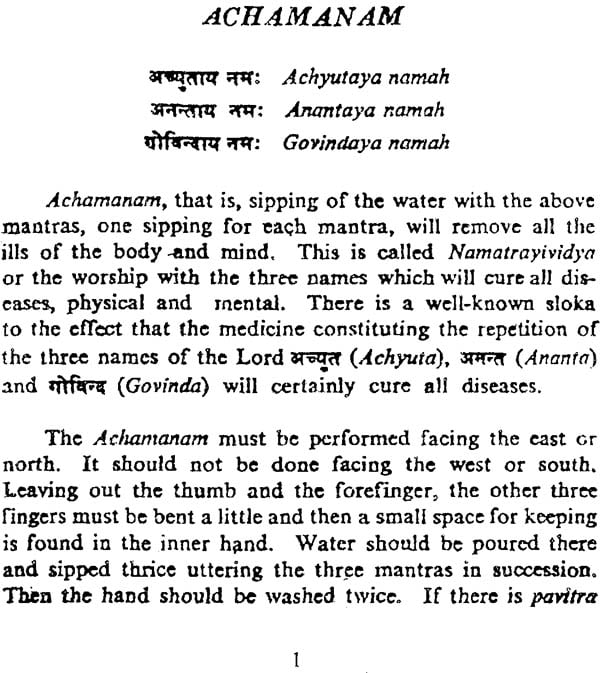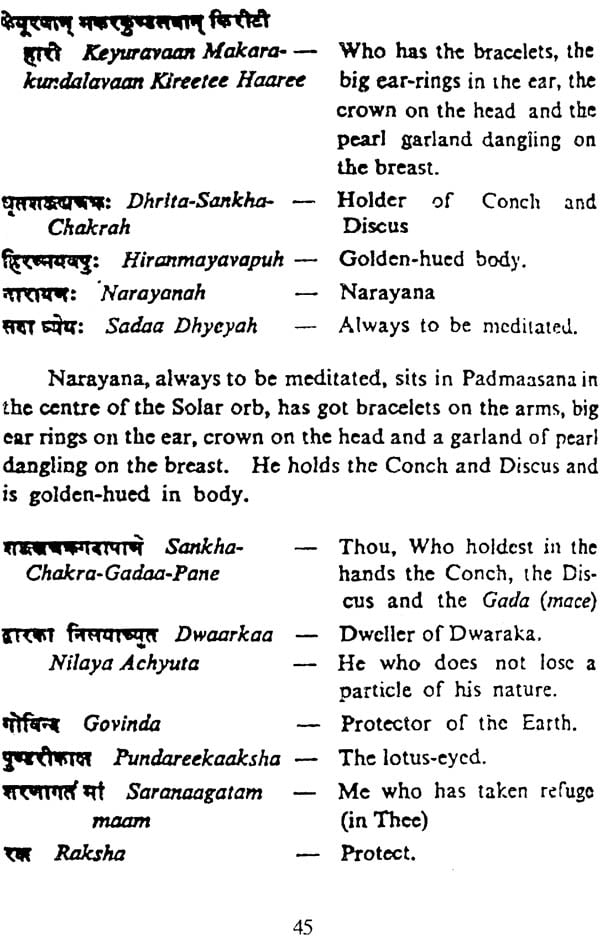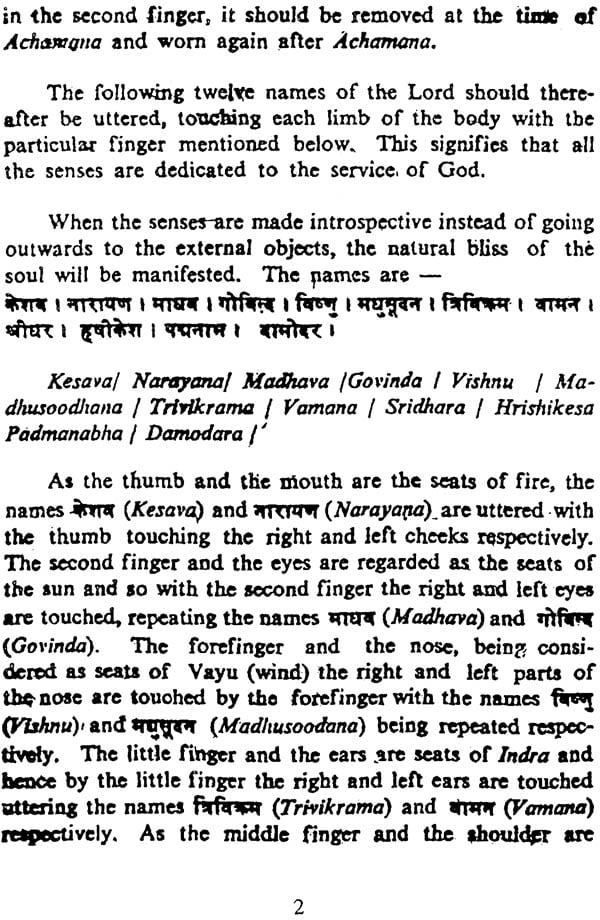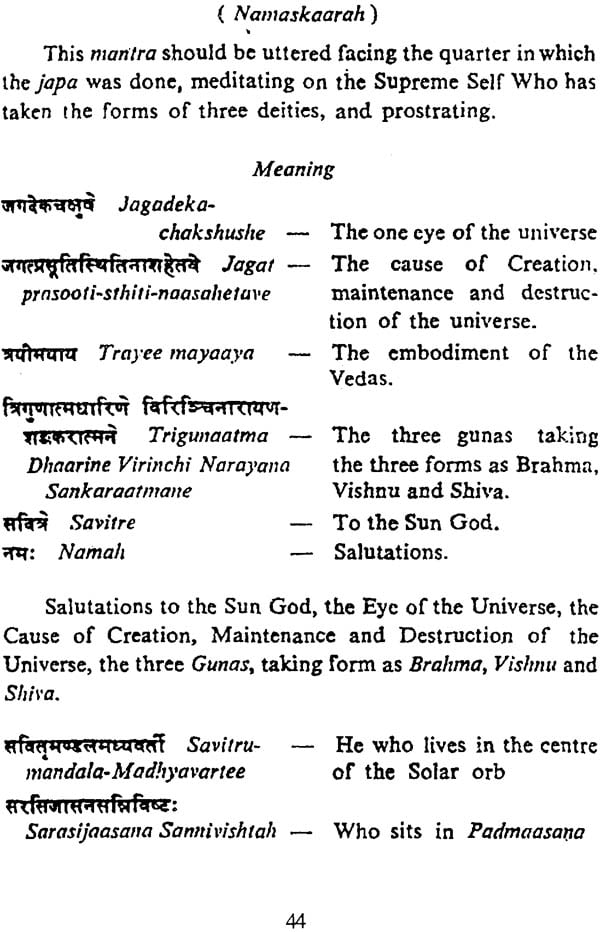
Sandhyavandanam ((Sanskrit Text, Transliteration, Word-to-Word Meaning and Translation))
Book Specification
| Item Code: | IDK511 |
| Author: | P. Seshadri |
| Publisher: | Bharatiya Vidya Bhavan |
| Language: | (Sanskrit Text, Transliteration, Word-to-Word Meaning and Translation) |
| Edition: | 2013 |
| ISBN: | 9788172764715 |
| Pages: | 47 |
| Cover: | Paperback |
| Other Details | 8.7" X 5.7" |
| Weight | 60 gm |
Book Description
About the Author
P. Seshadri Iyer, a great linguist and scholar, was born in Kerala. After passing his B.A. and M.L. examinations he began his career first as a school teacher and then as a sub-registrar.
His innate love for learning different languages arose out of his desire to learn at first hand the great classics of various languages in their original. Thus, he learnt Bengali to read all the writings of Swami Vivekananda, Marathi to read Jnaneshwari, Greek to read Marcus Aurelius and Epictetus, German to read Goethe's translation of Kalidasa's Sakuntala, Russian to read Tolstory's war and Peace as well as French, Finish and Polish to read masterpieces written in those languages. He had also a mastery over the different regional languages. He had also a mastery over the different regional languages of South India. But his proficiency in Bengali-both spoken and written-was so great that he could hold a Bengali audience spell-bound by his learned discourses in that language; and the late Shri C. Rajagopalachari chose him to translate his Mahabharata in Bengali. He also translated it in Malayalam and helped Rajaji to render it in English from the original Tamil. Indeed, Shri Seshadri was a linguist par excellence.
It was Sir C. P. Ramaswamy Aiyar (the then Dewan of Travancore State) who recognized the innate worth of Shri Seshadri. Hearing that such a great linguist and scholar was languishing as a sub-registrar, he commissioned him to translate into Malayalam such classics as Meditations of Marcus Aurelius, Montaigne's Essays and Plutarch's Lives, as also for writing an original com Ramanuja, Sri Aurobindo and Lokamanya Tilak. Sir C. P. then appointed him as the Superintendent of Travancore University's Department of Publications.
In his later years, Shri Seshadri's talent and scholarship were utilized by the Sahitya Akademi, New Delhi, for translating into Malayalam the great works of some Bengali. Hindi and Marathi writers as well as the History of Pelopponnesion War from Greek.
Shri Seshadri was a highly spiritual soul, endowed with the twin qualities of love and humility. He passed away in Bombay in August, 1969.
Preface
The Bharatiya Vidya Bhavan-that Institute of Indian Culture in Bombay-needed a Book University, a series of books which, if read, would serve the purpose of providing higher education. Particular emphasis, however, was to be put on such literature as revealed the deeper impulsions of India. As a first step, it was decided to bring out in English 100 books, 50 of which were to be taken in hand almost at once. Each book was to contain from 200 to 250 pages.
It is our intention to publish the books we select, not only in English, but also in the following Indian languages: Hindi, Bengali, Gujarati, Tamil, Telugu, Kannada and Malayalam.
This scheme, involving the publication to 900 volumes, requires ample funds and an all-India organization. The Bhavan is exerting its utmost to supply them.
The objective for which the Bhavan stands are the reintegration of the Indian culture in the light of modern knowledge and to suit our present-day needs and the resuscitation of its fundamental values in their pristine vigour.
Let me make our goal more explicit:
We seek the dignity of man, which necessarily implies the creation of social conditions which would allow him freedom to evolve along the lines of his own temperament and capacities; we seek the harmony of individual efforts and social relations, not in any makeshift way, but within the frame-work of the moral Order; we seek the creative art of life, by the alchemy of which human limitations are progressively transmuted, so that man may become the instrument of God, and is able to see Him in all and all in Him.
The world, we feel, is too much with us. Nothing would uplift or inspire us so much as the beauty and aspiration which such books can teach.
In this series, therefore, the literature of India, ancient and modern, will be published in a form easily accessible to all. Books in other literatures of the world, if they illustrate the principles we stand for, will also be included.
This common pool of literature, it is hoped, will enable the reader, eastern or western, to understand and appreciate currents of world thought, as also the movements of the mind in India, which, though they flow through different linguistic channels, have a common urge and aspiration.
Fittingly, the Book University's first venture is the Mahabharata, summarized by one of the greatest living Indians, C. Rajagopalachari; the second work is on a section of it, the Gita by H. V. Divatia, an eminent jurist and a student of philosophy. Centuries ago, it was proclaimed of the Maha bharata: "What is not in it, is nowhere." After twenty-five centuries, we can use the same words about it. He who knows it not, knows not the heights and depths of the soul; he misses the trials and tragedy and the beauty and grandeur of life.
The Mahabharata is not a mere epic; it is a romance, telling the tale of heroic men and women and of some who were divine; it is a whole literature in itself, containing a code of life, a philosophy of social and ethical relations, and speculative thought on human problems that is hard to rival; but, above all, it has for its core the Gita, which is, as the world is beginning to find out, the noblest of scriptures and the grandest of sagas in which the climax is reached in the wondrous Apocalypse in the Elevent Canto.
Through such books alone the harmonies underlying true culture, I am convinced, will one day reconcile the disorders of modern life.
I thank all those who have helped to make this new branch of the Bhavan's successful.









